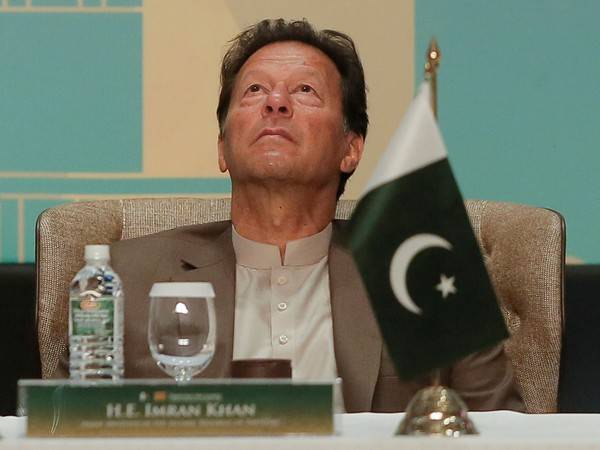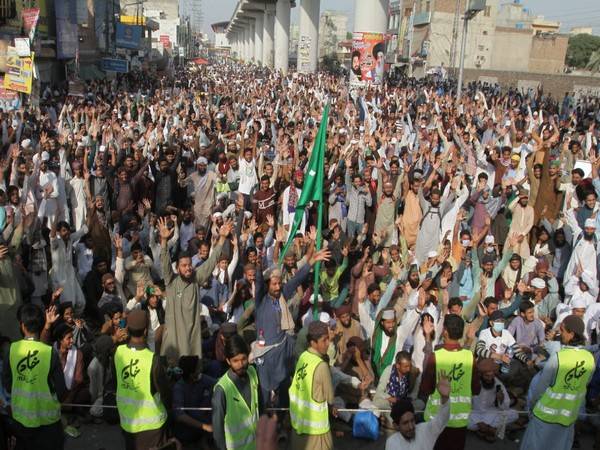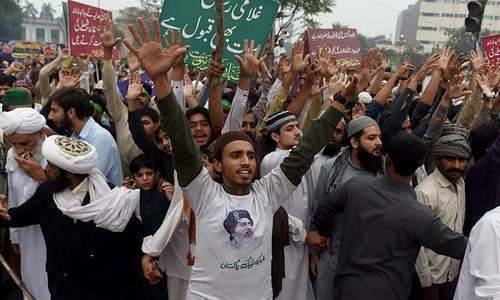The government officials and the TLP representatives finally came down to an agreement through negotiations, agreeing to the demands of the TLP, which led to release of hundreds of arrested protesters..writes Hamza Ameer
The decision by the Imran Khan led-government to give a major relief to the previously proscribed organisation Tehreek-e-Labaik Pakistan (TLP) from the First Schedule, has not only disappointed many in the country, but has also spread concerns over the precedent being set by the government, that may prompt other banned outfits to demand the same relief.
The government inked an agreement with TLP after weeks long anti-government protest march, led by the group, brought major cities of the country to a virtual standstill with violent confrontations between protesters and the security officials, resulting in major injuries and casualties of security officials.

The federal government was forced to deploy thousands of additional Rangers across the Punjab province while road routes from Lahore towards the federal capital Islamabad were blocked with trenches and containers.
The government officials and the TLP representatives finally came down to an agreement through negotiations, agreeing to the demands of the TLP, which led to release of hundreds of arrested protesters, review of the demand of removal of French Ambassador to Islamabad, release of TLP Chief Saad Rizvi, who is currently in detention and lastly, the removal of the name of TLP from the country’s list of proscribed organisations.
The government’s agreement on the terms has resulted in immediate removal of TLP’s name as proscribed outfit, while hundreds of the group’s members have also been released from different Pakistani jails.
However, TLP chief Saad Rizvi continues to stay in detention because the Federal Board of Revenue (FBR) is yet to give a date to hear Punjab government’s case regarding his detention.
With the federal government setting the precedent by removal of TLP from its proscribed status, concerns have been shared among government official meetings, that other banned organisations may also apply for the same relief.
The precedent that has been set, allows proscribed organisations to paralyze the country, challenge the writ of the state and create a chaotic situation that should force the sitting government in succumbing to the demands and even going to the extent recognizing a proscribed outfit.

This dangerous trend may become a major challenge for the Imran Khan government as there are at least 78 organisations, that have been declared proscribed by the country’s interior ministry, which includes names of globally recognized terror outfits.
Organisations including Ahle Sunnat Wal Jamat (ASWJ), Sipah-e-Mohammad Pakistan, Sipah-e-Sahaba, Jamat-ud-Dawa (JUD), Jaish-e-Mohammad, Tehreek-e-Jafria, Laskhar-e-Jhangvi (LeJ), Hizbul Tahreer, Baloch Liberation Army (BLA) and others are part of the proscribed outfits in Pakistan.
The affects of the dangerous precedent have already started to show as ASWJ has demanded removal of Sipah-e-Sahaba from the proscribed list, threatening to protest if the ban was not removed.
A similar demand has also come from the Shila Ulema Council, who have demanded removal of Tehreek-e-Jafria from the Pakistan’s list of proscribed organisations.

Leave a Reply